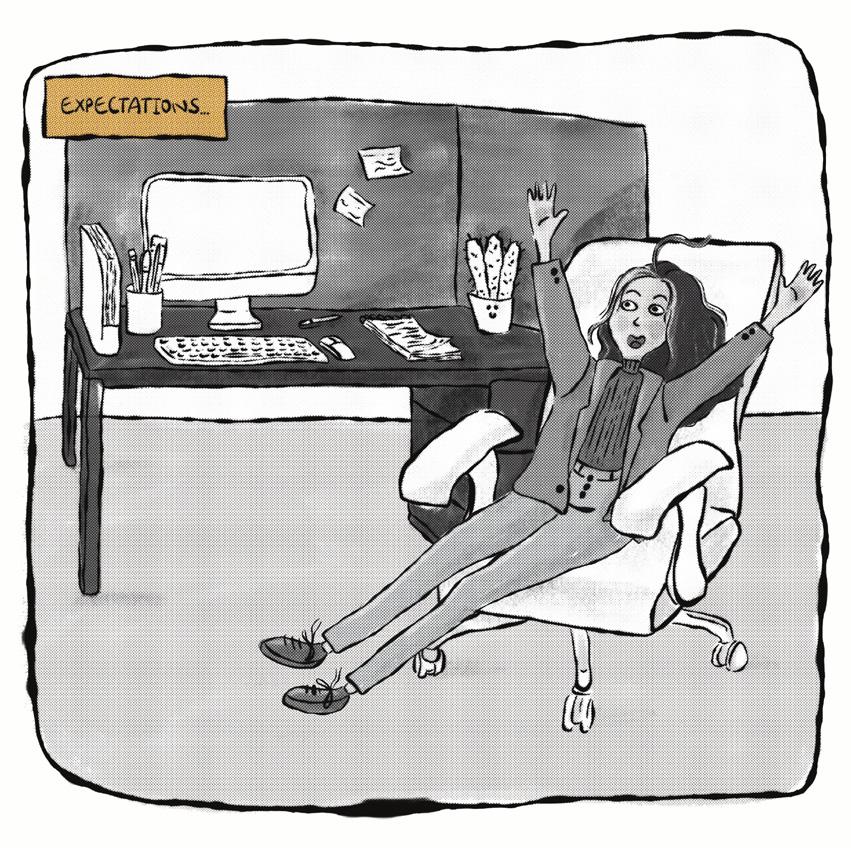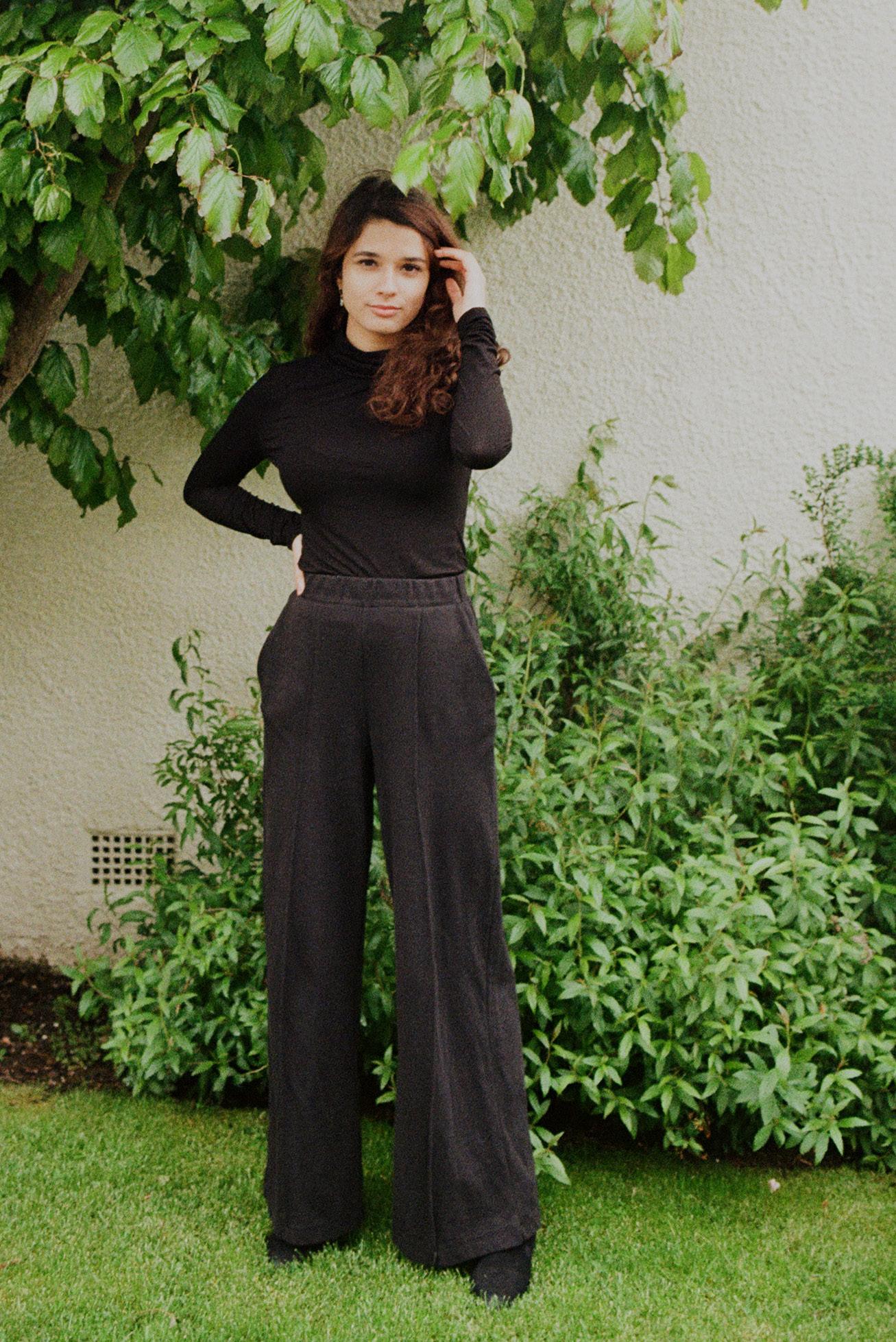
6 minute read
How we see things
2022 Law graduate Ayanda Ngobeni invited PhD student
Nuam Hatzaw and alumna Olivia Sweeney to meet. The conversation that followed began with sharing objects.
Advertisement
What happened next was funny, moving and at times unexpected. Here’s a transcript of the trio’s chat.
AYANDA: We’re gonna start by introducing ourselves. Nuam, would you like to go first, then Olivia?
NUAM: I’m a third year PhD student at the University of Edinburgh. I’m studying World Christianity at the School of Divinity.
OLIVIA: I graduated from Edinburgh in 2017 with a Master’s in Chemical Engineering, so I spent five years studying with the School of Engineering. Now, I work as a sustainable waste consultant in Bristol, for a company called Resource Futures.
I also have a side gig. I’m a Black and Green Ambassador. So that’s a National Lottery funded project that aims to lead, connect and celebrate diverse community action for the environment. It’s about exploring that intersection of racial and climate justice. I have a radio show, and I have a project that’s all about clean air.
AYANDA: I was quite interested in something you said Olivia, about intersectionality. What does that mean to you?
OLIVIA: So much of how we do things in the West and in academia is like, ‘this is this, that is that, this is this’. Intersectionality is just about exploring all those blurred lines and the grey in the middle and understanding that everything that makes a person or a society or a culture unique is about all those different bits that overlay and how that changes your relationship with people and the world and nature. I think it’s really important. I’m mixed race, so I sit at a very obvious intersection there, that duality.
AYANDA: Nuam, do you experience those grey areas as well?
NUAM: Oh, yeah, definitely. This whole kind of blurred lines as you mentioned, Olivia, is very much something that is of both personal and academic interest. I was born in Myanmar, but I’ve spent most of my life in Britain, as you could probably tell from my accent. I’m constantly thinking about who I am, and where I belong. And do I belong in Britain? I’ve spent most my life here but then at the same time, my physical appearance marks me out as different. So this kind of hybridity in between us is something that I explore in my academic research.
AYANDA: In terms of your academic research, what is it exactly?
NUAM: I was doing research in Myanmar, which is where I’m from. Originally, I was going to look at the faith experiences and the spiritualties and theologies of Christian women among my ethnicity in Myanmar, and then the pandemic hit. So that forced me to return home. And I spent the rest of 2020, like most of us, panicking, and trying to figure out how to continue my research. And just as I found a new direction, the military coup happened in Myanmar, which really closed the door to that avenue.
So the latest version of my PhD is now looking at the theologies of migrant women from my ethnic group: migrant women in the UK, and Europe. I’m basically questioning how their experiences of life, in a context so different from where they grew up, has impacted the way they understand God, the divine, all that kind of stuff. That’s a very kind of elevator pitch version of it.
AYANDA: And yes, Olivia, just from what Nuam said about her career and how it links to personal experiences, you kind of spoke about intersectionality and how it’s your personal experience. Would you say it’s also translated into your career?
OLIVIA: I’ve grown into my career, embracing more about who I am, and what my experience is, and bringing that in. The environmental sector is a bit all over the shop, because nobody knows what the environmental sector is really. So that’s part of the problem. But from the best data we have, it’s one of the least diverse sectors in the UK. So embracing, you know, what makes me unique within that, and then going with it and using it to your advantage.
At 18, when I started at Edinburgh, I definitely wouldn’t have been like, oh, you know, I’m going to have a job that means I have to talk explicitly on the radio about my race. . . definitely not!
NUAM: Does that ever get taxing, talking about your race and your identity as part of your day to day job?
OLIVIA: What’s good about Black and Green is it’s by the black community for the black community. So within the team, and your immediate hub, you’re around people like you or who aren’t going to ask stupid questions, and are not going to treat you like an EDI [equality, diversity and inclusion] consultant.
I think I’m still learning how [to say] what I want to say, and there’s definitely still stuff I don’t say, and don’t talk about. I don’t know if that’ll change, or if that’s just my boundary.
NUAM: It’s hard to find a balance, isn’t it? Because you know, you’re personally invested in this project as well. So you do want to talk about stuff that’s important, but at the same time it’s emotionally draining to be constantly reminded of this. Sometimes I feel like I have a sense of duty almost to be like, hey, if no one’s going to talk about this then I should because I’ve got personal experience, but then, you know, that’s a lot of responsibility on someone.
AYANDA: So Olivia, would you like to share with us what you brought with you?
OLIVIA: I have brought with me a necklace that my mum got me for my 21st birthday. It’s a Tiffany necklace and it’s the classic Tiffany heart, with my initials engraved in the back.
I was really grateful for it because it’s a lovely thing and it’s an expensive gift but at the time I’m like I’m not gonna wear that necklace. I don’t do hearts. But I wear it all the time now.
AYANDA: And Nuam, I believe you brought jewellery as well with you?
NUAM: Yeah, I’ve got my grandmother’s ring. It’s very blingy. It’s got like, three rows of about six rubies. She passed away two years ago. And when she passed, I got given it by my mum. So it’s very, very important and significant to me.
AYANDA: I’m quite curious, when you look at the objects you brought with you, what’s the emotion or special memory they evoke?
OLIVIA: I suppose the special memory is that fact that I had that gut reaction of just no, yet I kind of came full circle and really love it. And I think that’s partly because my mum knows me better than I necessarily know myself. But I’m not a birthday person. So even for my 21st I was just like, oh, it’s just another day, another year.
But it’s also that marker in time isn’t it? I’m only twenty-seven now, it wasn’t that long ago that I was twenty-one but even then to kind of you know, look back and be like, what’s changed? May that be physically, mentally, emotionally. I’m always after the new next thing, like the next goal, and that definitely comes from the type of university and school we went to. You’re kind of taught to be looking for the next achievement. So I don’t often look back and reflect. I think having those things that pinpoint moments is important to be able to do that.
AYANDA: What about you Nuam, does the ring encapsulate some kind of emotional memory?
NUAM: Yeah, it’s really significant to me, because it obviously reminds me of my gran. My gran and I were very, very close. She was a remarkable woman. She must have been like 80 when she migrated to the UK to look after me and my siblings, so that my parents could study at university. Which is insane when you think about it; here I am afraid to try a new restaurant in case I don’t like it and she was like, yep, I’m just gonna migrate, so I could be with my grandchildren.
She didn’t speak any English, she only spoke my language. So it must have been a terrifying experience for her to come over to a completely new place where she didn’t know anyone. The ring symbolises her commitment and devotion to us as a family. It reminds me of who she was as a person.
AYANDA: Olivia, can you tell us a little bit more about your mum?
OLIVIA: My mum is great! My mum and dad are very different, but very similar at the same time. They’ve been together sincethey were like 18. My mum’s the artistic and the emotional one. She studied Law and English, and my dad was Maths and Computer Science. So they have very different ways of thinking, which is why I’m lucky enough to have kind of both of those in me. My mum gave it all up to have me. She did go back to work for a while but she was like, I don’t want to leave her in a nursery. And so I think as a woman, I’m always thinking, do I want kids?
My mum is white British and my dad is from the Caribbean. So when talking about race and those things, those conversations can be hard because it’s coming from a different place with each person. And my mum obviously doesn’t have the experience of not being white. But today, I had a day from hell for various different reasons. And I could just call her







